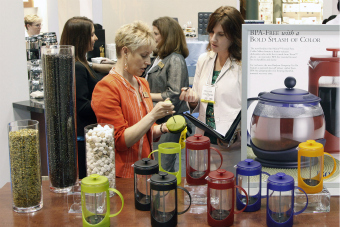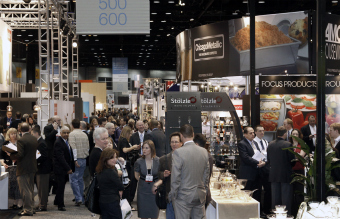Made in Chicago: At the 2011 International Home and Housewares Show
By Kevin Robinson in News on Mar 9, 2011 5:30PM

Photo via International Home and Housewares Show.
Buyers and entrepreneurs met in Chicago for three days among three exhibition halls full of housewares, broken into categories that encompass everything from dining and entertaining to cleaning and bathrooms, and everything in between. Jay Kelly, who handles media relations for the event, pointed out that American made products have taken a more prominent role in this year's show. Indeed, walking among the vast exhibition halls of McCormick Place, stylized American flags and "Made in U.S.A!" logos were prominently displayed on everything from cleaning products to pet treats, cookware to toys. Of the list of American made exhibitors Chicagoist was given, 13 were made in Illinois.
Arrow Plastics, a manufacturer of a multitude of consumer products, has been in business for 60 years. Originally started in Chicago, Arrow outgrew its operations here and moved to Elk Grove Village in 1986. John Coursey, Arrow's Senior Vice President of Sales, said that their products are in nearly every grocery, discount and drug store you might frequent. "There's probably not one that doesn't [stock] at least one of our products," Coursey proclaimed. Arrow hasn't built its business on a brand like Rubbermaid or Kraft have, Coursey added, "but we have products — H2O to Go, for example — that have their own reputation."
Coursey said that Arrow supports 200 families in Illinois with the jobs in its Elk Grove Village plant, where many of the workers are long-term employees and "we'd like to maintain that." Aside from quality and price, Coursey said, "I believe, at least right now, you get a lot more credibility for being made in the United States. People know why unemployment is so high, and they see that we have a quality product." Coursey noted that making their products in the United States was an easy decision. "We're good at it. We were comfortable with it. We're smart enough, we're automated enough" for the business to be profitable. Reliability and safety are also a big part of the reason Arrow makes its plastics in the U.S. With a product base that's built on a lot of blow-molded, light weight plastics, "it's not efficient to ship air."
"We can compete," Coursey maintained, because it doesn't make sense to ship large, lightweight empty plastics across the ocean.
SpiceStack, a kitchen organizer for store-bought spice jars, was conceived by Lauren Greenwood in 2007. Initially sold on the internet, SpiceStack is made in Elk Grove Village, where she had a connection to a local plastics maker who could handle small orders and turn them around quickly. "I get handwritten letters from people in the middle of the country thanking me for making my product in the United States," Greenwood said.
Among the benefits of manufacturing the SpiceStack in the U.S., Greenwood noted the jobs that her company supports, and the ability to make and ship smaller quantities of product quickly. She also noted the quality of the product being produced and her ability to visit the facility where they are produced if there is an issue with production or a question about how to deal with something related to the product.

Photo via International Home and Housewares Show.
TJ Dombrowski is a local inventor who founded Disposal Guard. In 2004 he was teaching a group of local children to cook their favorite dishes - "I love to eat, I'm from Chicago!" he said, patting his belly - and realized as he was pushing food scraps into a garbage disposal with his hands that he was demonstrating something unsafe. Thus began his quest for a kitchen utensil that could safely push food scraps into an in-sink garbage disposal, and a quest to design an all-in-one kitchen tool that could also be used as a sink drain plug and strainer. Seven months ago he earned his utility patent on the Disposal Guard, which he produces in his garage, as well as in a shop in Elk Grove Village. He said that his product has attracted a lot of attention from the makers of in-sink garbage disposals, as well as large household and hardware stores.
Asked if he felt any pressure from institutional buyers to outsource his production, he said "they know not to even ask." Noting that garbage disposals are big in North America and Australia — "We make the best stuff!" he proclaimed — Dombrowski wants everything made in America.
"If I can make a million dollars making my product in America, and $1.1 million outsourcing it, what's the point? Why put people out of work? What am I going to do with that extra $100,000? The other people here maybe look at me like I'm nuts."
Nevertheless, Dombrowski feels confident that he has a winning product, and any expansion his company experiences will result in more manufacturing in the United States. "Ive been looking at Texas and New Mexico," he says. "It's really up to Illinois and what they decide to do here. But we're staying in America."
Housewares made in Illinois are highlighted in red.